- Home
- Susanna Kearsley
Named of the Dragon Page 14
Named of the Dragon Read online
Page 14
I let my eyes follow the flight of the crows as they rose in a whirl from the parapet. "Christopher said that?"
"Perhaps not in so many words," she admitted. "He implied it, though."
It surprised me that Bridget should fall so completely for Christopher's bald-faced attempt to seduce her. Not that I imagined he was aiming for seduction in the carnal sense—I fancied he respected James's feelings more than that—but like Bridget, he couldn't seem to help himself. I turned, now, and teased her, "You're losing your touch, if the most you could get from the man was a mere implication."
"Rat." Her eyes brimmed with laughter. "But you're right, I shall have to try harder. It's a shame I can't get him alone for an hour."
"I could try to keep James occupied this afternoon," I offered. "Would that help?"
"Well..."
I saw her doubtful look and sighed. "Oh, Bridget, please. My interest is professional. I don't want James's body, just his books."
"I know, I know. I'm sorry."
"Look, if this is going to be a problem... if you'd rather that I didn't try to sign him ..."
"What, and see you miss your shot at a directorship? No chance," she said, and shook her head. "Of course you must represent James, don't be silly."
I didn't have the heart to tell her that the offer of a directorship had nothing to do with James—that it was Gareth my employers wanted. Not that I'd have told her, anyway. Bridget had a gift for indiscretion, and the last thing that I needed was for Gareth to find out about my letter from the agency—he'd think it vindication of his earlier suspicions, that I'd come down here in search of him, and not because of James. Not that I cared what he thought, I reminded myself. I simply didn't want the aggravation.
Bridget gathered her hair back and started to plait it. "So all right, then. When we get to Pembroke, you take James."
She might have been asking me to mind her pet spaniel. I smiled. "And where would you like me to take him?"
"Oh, anywhere, I don't know. Ask him to show you the castle, he'd like that. Like I said, I only need an hour."
I admired her confidence. Still, given odds, I'd have put my own money on Christopher. Having watched him last night, I knew that his manipulative skills were at least equal to Bridget's and whatever he knew about Gareth Gwyn Morgan, he wasn't too likely to tell her so soon—he would spin it out, artfully; give her a little bit here, and a hint of it there; keep her hungry for more.
She glanced at me. "You'll just have to make sure he doesn't suspect."
"What, James?" I raised my eyebrows. "The man who went on building sandwiches and munching crisps last night, while you Mata Haried his brother? I shouldn't worry. He's either the most trusting man that I've met, or he's hopelessly thick when it comes to relationships."
"He's not thick," Bridget told me. "He's just self-absorbed."
"Ah."
"Most authors are, really."
"I'll try to remember that."
"I'm not, of course. But then, I'm not an author."
"Since when?"
"I'm a writer," she said. "There's a difference. Authors are rarefied creatures, you know, who write serious fiction."
"And writers ... ?"
"Write books people buy," she explained, with a twinkle of mischief.
A voice from the doorway made both of us jump. "Do you know," James said lightly, "I really must stop sneaking up on you, darling. I hear the most slanderous things."
Bridget whirled, both hands holding her half-finished plait. "All right, then," she told him, "I take it all back. Your fiction's not serious."
"Thank you. That's much better." He moved in to give her a kiss as she fastened off the plait and flipped it down between her shoulders. He mustn't have been standing in the corridor too long, at least not long enough to hear me call him thick, because the smile he turned to me was rather cheerful. "Are we ready?"
"Yes, just let me fetch my raincoat." For after all, I reasoned, as I went out to look on the pegs in the hallway, some of us didn't have Bridget's allure. And if the rain began again, I couldn't count on anybody rushing up to me with an umbrella.
*-*-*-*-*
I had seen the castle twice now from the outside, but I still caught my breath as we came round the bend and the great grey walls soared from the top of the hill, keeping watch on the huddle of rooftops below, making toys of the cars that were climbing the steep road towards it.
James switched the wiper on to clear a scattering of moisture from the windscreen, and took a turning just below the high street, squeezing the Merc into a narrow, high-walled lane. "The challenge," he said, "will be finding somewhere to park."
I knew we'd have no trouble, not with Bridget in the car. She could find a spot on Soho Square, and that was saying something. As we inched along the lane we passed a string of terraced car parks and I sealed back to watch as Bridget pressed against her window.
"There," she said, and pointed.
James shook his head. "However do you find them?"
"It's a gift."
He neatly reversed the Merc into the space, and the wiper made one final squeak on the glass before stopping. A burst of fresh, damp air invaded the car as James opened the driver's side door. "Right then, everyone out."
Christopher, wedged in the backseat beside me, shifted one leg in experiment. "I don't think I can move, you know. You'll have, to leave me here."
"Poor thing," said Bridget. Scrambling out, she pulled her own seat forwards and reached back to help him. "Here, take my hand."
"I can't feel my feet."
"It's my fault, for making you ride in the back." Bridget tried to look properly remorseful. "If it wasn't for the fact that I get car-sick..."
"It's all right." He stood and stretched awkwardly, cramped at the knees. "Not to worry. I'm sure that the blood will return."
"Oh, stop whining," said James. "Just go get me a pay and display sticker, will you? The machine's over there."
Christopher stood firm a moment, rebellious, then—being the younger brother—gave in from habit, limping away on stiff legs.
This car park, ringed with stone walls, nestled right behind the high street—I could see the huddled backs of shops and businesses, and hear the swish of unseen traffic sliding wetly past them. The wind, still thick with unshed rain, sailed leaves across the shallow puddles at my feet, and I tipped my face to feel its damp caress, turning slowly round to see the view from every angle.
The low ivied wall at the rear of the car park must once have been part of the old town's defences. Beyond it, the ground tumbled steeply down into a valley, then climbed again, slowly, under a jumble of rooftops, to crest a small hill on the opposite side.
Bridget, at my shoulder, craned forwards to study the green strip of parkland that ran through the valley directly below us. "We could have just parked on the Common, you know. There's a space there, as well."
I looked, hard. "Where?"
"Right there, by that tree. Don't you see it?"
Christopher, returning with the parking sticker, looked at her in mild dismay. "What, we're moving the car?"
"No," said James, "we are not." To emphasize the point, he took the sticker from his brother's hand and pasted it firmly to the inside of the windscreen. "There." The door locks clicked shut as he armed the alarm. "We're good for two hours, now."
Bridget looked doubtful. "Only two?"
"Darting, it's Pembroke, not Bond Street."
I sent him a pitying glance as we walked towards the narrow brick arcade that joined the car park to the high street. "I can tell you've never shopped with Bridget."
"Why?"
"She's not exactly known for speed. I've seen her spend two hours in John Menzies alone, buying magazines."
"Oh."
Bridget linked her arm through his, and smiled win-ningly. "Darling," she said, as though the thought had just occurred to her, "why don't you take Lyn and show her the castle?"
"I've seen it a thou
sand times."
"Yes, but it's bound to be more fun than trailing after me."
"True." He glanced round at me. "Would you like to do that? Right, then. Chris, what are you doing—staying with Bridget or coming with us?"
Bridget, startled, lost her smile. She hadn't thought of that.
But Christopher gave the right answer. "I'll stay. There are one or two things I should pick up, myself, while I'm here."
The arcade brought us out at the side of a florist's shop, wafting thick fragrances on to the pavement, die plastic pails set round its walls spilling over with freshly cut flowers. Above them, the windows were hidden by holly wreaths, festive with red tartan ribbon and roses or sprays of red berries.
"Ooh," said Bridget, stopping.
James, who appeared to have no patience whatsoever for window-shopping, consulted his watch. "Right, we'll meet you back here at a quarter past three, then." And taking my sleeve in a purposeful grip, he steered me away, down the pavement.
Every town's high street, I thought, had a character. Some were young venture capitalists, slicked-down and smart, while others were tarted-up mannequins, flash without substance, relying on paint to impress the observer. And some were older women, highly bred and full of grace, who seemed to carry beauty with them as they aged. Pembroke's high street—or rather, as James corrected me, its Main Street—was a favourite aunt, lively and cheerful, with an ample lap to welcome you and arms to hug you tight.
As in Angle, all the buildings here were painted in the pastel seaside shades of salmon pink and cream and soft mint green and yellow, the row of colours adding to the general festive air. Around us the shop windows glowed with a warm light that softened the grey afternoon, and the shimmer of tinsel and twinkle of fairy lights blended with snatches of carols and Christmas songs spilling from opening doorways. On the pavement the bustle of bodies pressed close and flowed past like a chattering stream. The teenagcd girl in front of me, her outrageously striped woolly hat smelling strongly of incense, stopped without warning to look in a window, and stepping around her I dodged two young women who'd paused with their pushchairs to greet one another.
"Bloody people," said James. "This is why I don't like to come shopping."
I smiled. ' 'Well, you may find that being with me is no better. I do like to puddle around, in a castle—it drives people mad."
He didn't look worried. "I'm sure I'll survive."
Stretched like a slumbering beast at the top of the street, Pembroke Castle watched the whirl of life and colour passing underneath it, as it must have watched a thousand other market crowds of Christmases long past. The walls loomed very close now, and looking up I felt a surge of childish excitement.
"Careful!" James grabbed my arm for a second time, pulling me clear of a wooden bin heaped with pale cabbages. The pavement here narrowed, in front of the fruiterer's. Breathing the pungent mixed smells of the tropics and sharp autumn orchards, I waited with James for a break in the traffic, then made a brave dash to the opposite side for our final approach to the castle's main gate.
We paused to buy our tickets in the gift shop near the entrance. "Don't be daft," said James, when I offered to pay. "You're my guest."
So instead I invested my pounds in a guidebook—a thick and thorough-looking publication with a plan of the castle set in like a centrefold. I pulled it out, for reference, as we passed through the outer gate into the barbican.
"I assume that we're meant to go this way," I said, pointing left. "Up into the Bygate Tower, and round the walls, clockwise."
"Then let's go the other way. Live on the edge." He was mocking, of course, but from what I'd seen of James I suspected he liked leading minor rebellions. He paused underneath the portcullis, hands on hips. "The most logical place to begin is die Keep, really. Start at the middle and work our way out."
I looked where he was looking, straight ahead. The castle was an ancient one, built, my guidebook told me, by a Norman earl named Roger de Montgomery. The guidebook went on to brag that when the Welsh had laid siege to the Norman invaders, a year or so afterwards, Pembroke's castle had been the only one in all of southwest Wales that hadn't fallen. It was easy to see why.
Roger de Montgomery, and those who had come after him, had built the castle thick and strong and solid, double-warded.
We were entering the Outer Ward, a level field of close-clipped green with one large square of tarmac that I guessed provided space for modern spectacles. In olden times, when danger threatened, those who laboured in the fields around the castle walls could move their families here for safety, while their lord and master made his own retreat to the enormous round-walled Keep within the Inner Ward. This massive tower, meant to stand when all the other fortified defences had been breached, would be the final refuge of those living in the castle, and the men who'd built it knew that they might one day need its strength.
While the halls beside it crumbled from the strain of staying upright, Pembroke Castle's Keep had stood through eight long centuries of tumult, and looked capable of weathering another eight with ease. It had been poked at, over time. Bits of the parapet surrounding the domed roof had tumbled down, or been removed, and when we walked round to the north side I could see the black and jagged hole that marked the first floor entrance, stripped of all its finer facing stones. But such small scars went virtually unnoticed on a building so imposing.
"I'm not sure you should be doing that," said James, as I scampered up the flight of steps towards the gaping doorway. "Those steps might not be safe. And anyway, you can't get in that way, you have to go through here."
The steps didn't feel dangerous, but I didn't imagine that open defiance was something James craved in an agent, and I ought to be trying to show him how well I could listen. Reluctantly, I turned back and went through the proper entrance, a much smaller door set at ground level. It felt like walking through a tunnel—the walls of the Keep must have been a good twenty feet thick—but at length it discharged us, like puny adventurers, into the cavernous space.
"You see?" James, who had seen it before, pointed up at a ragged-edged hole, streaming light. "It's a doorway to nothing, the floors have all gone."
I had tipped my head backwards, struck dumb by the sight.
Originally, there would have been three or more levels here, comfortable rooms, wooden floors, warming fires that burned in the royal apartments, but all of that was lost now to the callous hand of time. What remained, though, was in some ways more impressive.
Stripped to its bare outer walls, it was like a cathedral, a great hollow soaring cathedral of stone, with a perfect domed ceiling and small arching windows that slanted pale light through the reverent gloom. From every ledge and opening long streaks of soft and mossy green dripped downwards, passing shades of rust and gentle blues that stained the walls in places where the plaster had not fallen from the grey, unyielding stones.
I took a breath, inhaling dust, and fumbled for my guidebook. "Seventy-five feet," I said, in awe. "This shaft is seventy-five feet tall."
James looked at me. "You say that as though it's a challenge."
"It is." I'd always liked climbing things. Turning, I spotted the newel stair, and happily squeezed up one tight winding flight to the first narrow landing. Resting my hands on the cold metal piping that served as a guardrail, I leaned through the open arched doorway to look down at James. "Coming up?"
"No, I've done it once, thank you." He sauntered forwards, moving through a shifting web of light and shadow, to see me better. By the time I reached the third and final landing, he was standing in the centre of the floor. "Do warn me if you're going to fall," he said, "so I can step aside."
"You wouldn't catch me?"
"From that height? You must be mad."
I took a firm grip on the guardrail and leaned out as far as I dared, to admire the view. The dome, from this height, was a marvel of masonry, hundreds of stones set with perfect precision to form an impossible half-sphere that floate
d above me. Absorbed, I leaned further, and felt my hand slip in the instant before something clamped round my shoulder.
"Don't worry," said Gareth, behind me. "I’ll catch you."
XIX
Cadwalader's blood lineally descending,
Long hath be told of such a Prince coming,
Wherefore Friends, if that I shall not lie,
This same is the Fulfiller of the Prophecy.
Citizens' Welcome to Henry VII at Worcester, 1486
I nearly shot out of my skin. Only when he'd hauled me I away from the edge, when my heart had returned to my rib cage and everything seemed right side up, did my fear turn to fury. I sputtered and burned like a fuse as I whipped round to yank myself free. "Dammit, what are you doing? You scared me to death."
"Then we're even." He let go my shoulder but didn't step back. He was closer to me now than he had ever been, close enough that I could smell the cleanness of him, the soapy warm scent of his skin and the trace of detergent that clung to the folds of the shirt that he wore underneath his dark jacket of old, beaten leather that smelted of the damp, cold outdoors.
He'd been up on the roof, I thought. Feeling the chill draught that swept down the spiralling stairs just behind us, I realized that Gareth would have to have been there, concealed by the shadows and blocking the wind, when I'd climbed to this level. I would have heard him, otherwise— he couldn't have come up or down the stairs, without me hearing. So he must have been there, standing silent, watching me...
In the confines of the landing, with the stone walls pressing all around, this new awareness of him felt disturbing, and I had to fight back an irrational urge to leap over the edge of the guardrail and into the void.
"You'd have bloody well broken your neck," he came back at me, "falling from here."
I looked up and studied his thundercloud face with the calmness that follows a shock, seeing no reason why he should be angry. "I was not," I said, very sure, "going to fall. I was perfectly balanced."
"Well, the next time you balance so perfectly, see that you're not standing sixty feet up."

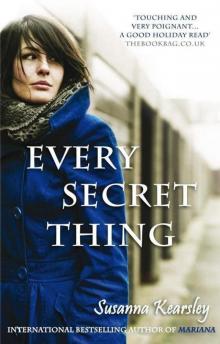 Every Secret Thing
Every Secret Thing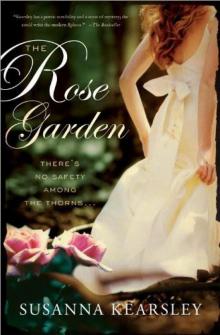 The Rose Garden
The Rose Garden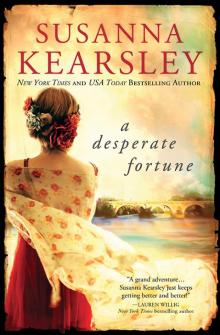 A Desperate Fortune
A Desperate Fortune The Winter Sea
The Winter Sea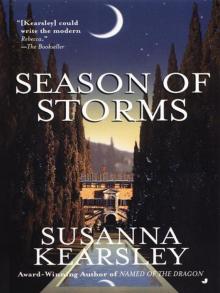 Season of Storms
Season of Storms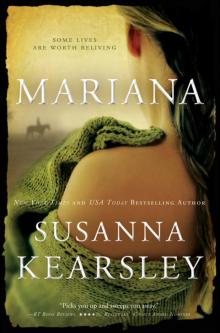 Mariana
Mariana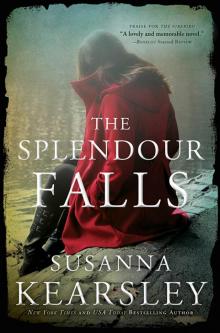 The Splendour Falls
The Splendour Falls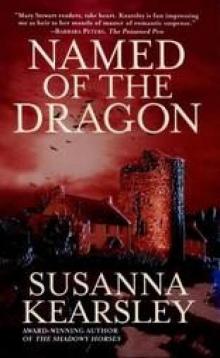 Named of the Dragon
Named of the Dragon Sophia's Secret
Sophia's Secret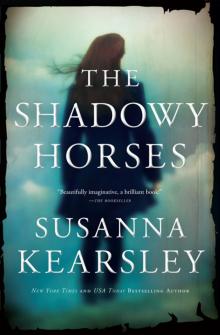 The Shadowy Horses
The Shadowy Horses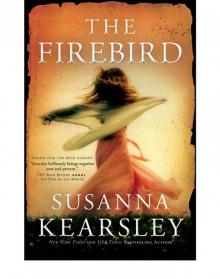 The Firebird
The Firebird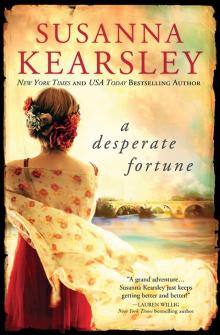 Desperate Fortune
Desperate Fortune